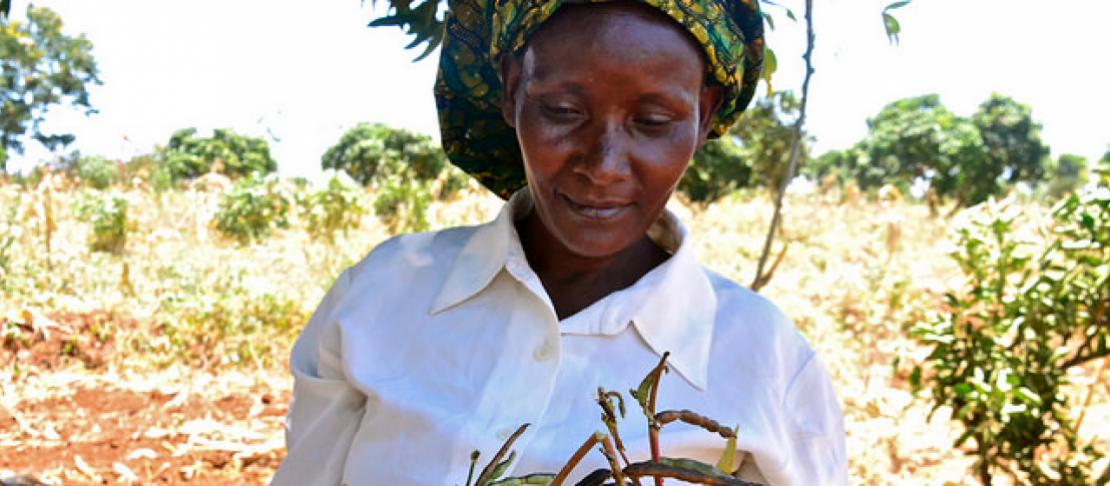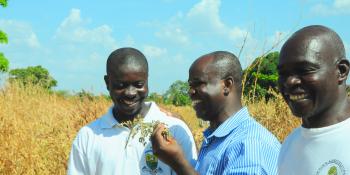Solutions for scaling up innovative climate-smart agriculture in Africa

Report back from side event at Africa Pavilion (COP21)
Pilot projects are great - they offer glimpses into what's possible, and often harness cutting-edge ideas and technologies. But real success can be claimed only when a project has made an impact at a larger scale. Not for hundreds of people but for hundreds of thousands. A 4 December session at the Africa Pavilion on "Scaling up innovative approaches to climate-smart agriculture in Africa" featured perspectives from implementing agencies, researchers, investors and funders on key lessons for success. The session was co-organised by the CGIAR Research Program on Climate Change, Agriculture and Food Security (CCAFS) and Technical Centre for Agricultural and Rural Cooperation EU-ACP (CTA).
James Kinyangi, CCAFS East Africa program leader, highlighted the work of CCAFS in developing and implementing technologies and innovations to address the challenge of food security under climate change. This includes working in partnership with African countries in developing policies and programs to ensure agriculture is part of the solution. He also mentioned the need for researchers to work very closely with farmers organisations and private sector, to identify and scale up sustainable solutions.
View side event photos
Ms. Aïda Ndong, Director, Senegal Meteorological Services (ANACIM), shared an innovative program where more than 4 million rural people in Senegal now have access to climate information via rural radio and SMS. This system helps farmers deal with uncertainties around weather and climate, by offering short-range weather forecasting and nowcasting. The information given includes the optimal date for sowing and harvesting as well as advice on which varieties are likely to be mort climate-resilient. The Senegal program is a model for scaling up, and an excellent example of how a national agency can directly support farmers.
Dr. Delali Kofi, Ministry of Food and Agriculture, Ghana, shared the country’s Climate-Smart Agriculture national action plan, which addresses effective adaptation, low carbon growth and social development. He highlighted the goal which is to ensure a climate-resilient and climate-compatible economy. Local action is very central, as climate change effects are location-specific. Site-specific responses are developed through inclusive partnerships that include multiple levels of agriculture, ensure gender representation and also include multiple levels of government.
Gargule Achiba, Researcher, University of Berne Switzerland, presented Index-based livestock insurance (IBLI) as an innovative tool to combat losses from drought in Northern Kenya, where livestock contributes about 40% of household income. He explained how index-based livestock insurance can reduce climate risks for African pastoralists by compensating herders for losses when weather reaches a pre-set threshold for example days of drought or a maximum temperature. He highlighted that public-private partnerships have made this initiative a success in Kenya. The key to scaling up is to ensure coverage of 40% of pastoralists, using information and extension services to stimulate demand, and designing systems based on high-quality data.
Prof Idowu Oladele, North Western University, South Africa highlighted the Use of ICTs as a solution to improve farmers’ resilience to climate change in Ethiopia and Kenya. Information and advisory services are designed to stimulate practices that are water-smart, energy-smart, crop-smart and weather smart. The agro-advisories are shared via SMS, radio, newsletters, interactive voice response and television. Agro-input dealers are major partners in the project, which helps ensure widespread availability of information and advisories. Input dealers are able to promote climate-smart agriculture as a means for them to market their products.
We can’t just add up many small-scale projects for scaling up - Isabelle Coche
The panel discussion, moderated by Michael Hailu, director of CTA, included Isabelle Coche, representing the private sector group International Agri-Food Network (IAFN), and Bernard Rey Director, Sustainable Growth and Development, Directorate Development and Cooperation, European Commission. Coche expressed satisfaction that many of the examples given are already scaled up. She highlighted that the private sector can bring knowledge, tools and technologies to a partnership but they are limited, as they cannot influence national policy. As well, there needs to be demand from farmers and communities for solutions. She pointed to the Ghana initiative as a model – the national policy is a crucial framework for scaling up. “We can’t just add up many small-scale projects for scaling up,” said Coche. “We need alignment of policies and strategies.” Ultimately, national and regional governments need to support infrastructure and create a good regulatory environment that encourages private sector initiatives.
Bernard Rey highlighted the critical impact climate change is having on all aspects of development and all investments related to development. He noted that the EU is going to assist partners in 60 countries around agriculture and food security, bringing more than 8.5 billion Euros in a 6-year period. He noted that adaptation as well as mitigation need to be integrated into initiatives. The EU has recognized the need to work with the private sector, he said, though more work is needed to address risk and address the public good. “We want to ensure that development assistance contributes to a world without hunger, and a world better equipped to deal with climate change,” he said.
read more
Vanessa Meadu is the Global Communications and Knowledge Manager for the CCAFS Program.



